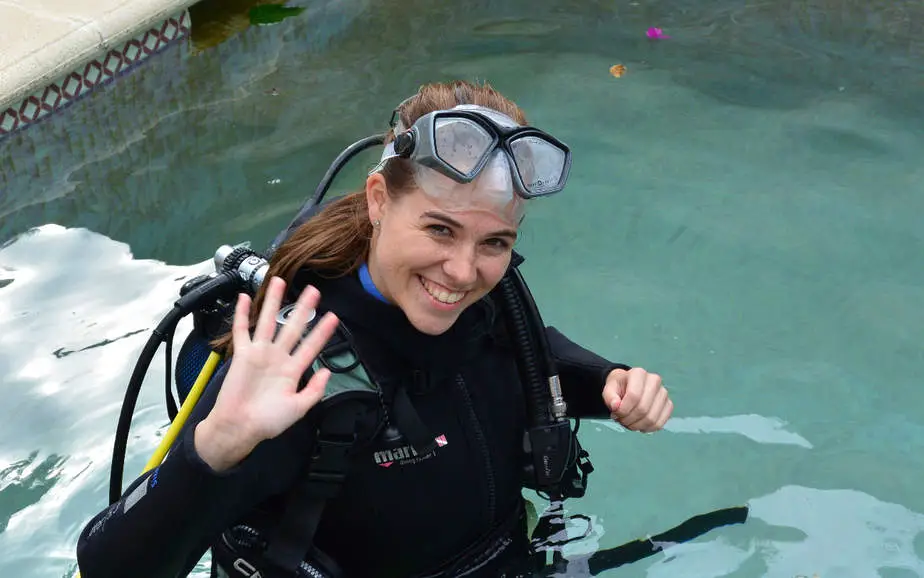There are many reasons why scuba diving is a hobby that is worthy of your time, effort, and money. If you love adventures, the outdoors, meeting new people, exercising, and exploring, then scuba diving sounds like something that’s right up your alley. With that said, scuba diving does have quite a high barrier of entry compared to other hobbies, so the question is is scuba diving worth it for you?
Perhaps you’ve heard of some scuba diving horror stories – bad experiences with the Open Water course or negative comments about diving in general. For instance, getting water in your mask or mask fogging up, ear pain and mask barotrauma due to water pressure, lots of time in a classroom setting learning about confusing dive tables, heavy equipment and so on don’t sound like a lot of fun. How soon until you can explore shipwrecks and swim with manta rays?
It’s pretty reasonable to ask if scuba diving is worth it, and even though our answer is obviously a biased yes, we want to make the argument that scuba diving is a sport that is worthy of your time. It will win you over due to its own merits, perhaps with a gentle nudging from us to start you off. Approached correctly, the whole process of getting certified and getting started with diving can be a fun experience. A whole new frontier awaits you underwater, and in this article, we’ll explain why it’s worth exploring.
Is scuba diving fun?
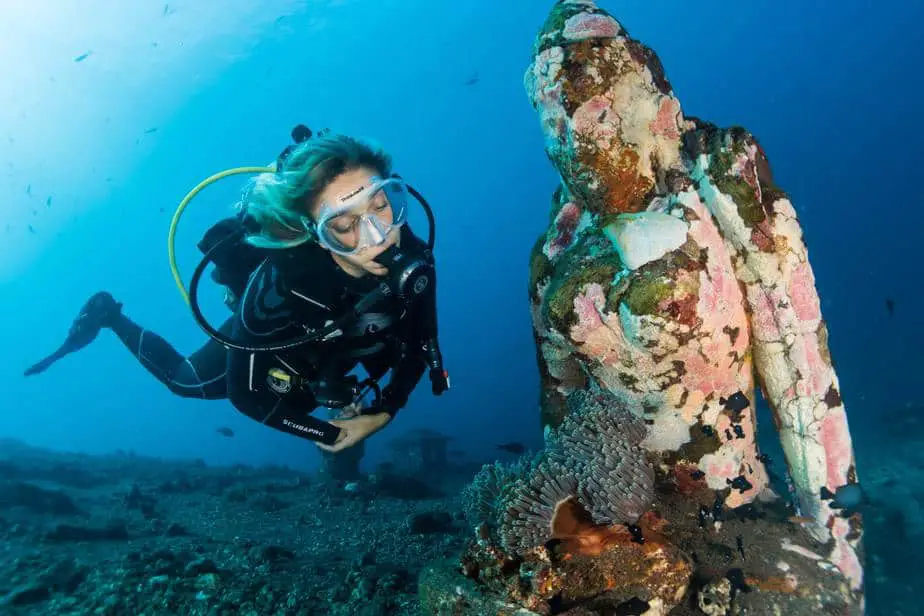
Are you aware that water covers approximately 71% of the earth’s surface, and that “more than eighty percent of our ocean is unmapped, unobserved, and unexplored.” For most people, these numbers are just useless trivia information. For the scuba diver, it means there’s a whole lot of places for us to explore. Just thinking of all of the adventures that I’ve still yet to go on makes me feel excited.
While it’s possible to get a glimpse of the underwater world by snorkeling or SNUBA diving, scuba diving is the only way you can genuinely reach deep depths (30m / 100 ft or more) to explore shipwrecks, see reclusive marine life, and immerse yourself in what the ocean has to offer.
The experiences scuba diving can offer you are truly unique. Imagine the feeling of weightlessness like you’re floating in space. During deep sea dives or night dives when darkness envelops you, it honestly feels like you’ve left the earth. Until space exploration becomes the norm, this is basically the closest thing you can experience.
Another unique sensation is the feeling of flying by riding a current while drift diving. You can also be treated to incredible views of the pristine coral reefs during the day and get an entirely new experience doing a UV night dive.
Scuba diving is not just a fun activity to do, it has many practical benefits such as being a good way to exercise, to provide relief for chronic injuries, and to get away from the noisy world and calm yourself in the peaceful tranquility of the ocean.
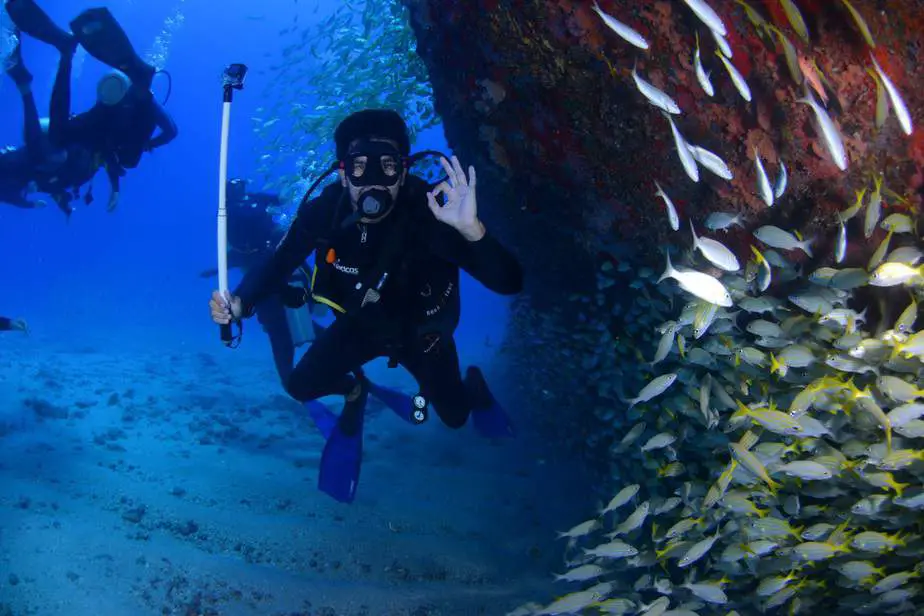
Once you’ve learned the basics of scuba diving, you can apply it when you travel all over the world. This gives you more things to do on vacation, and may even be the entire point of your vacation if you’re doing liveaboard diving. Each dive site is different, and you will encounter wildlife and environments that you’ve never seen before.
You don’t even need to travel to scuba dive even if you live in a landlocked state. Surely there are local freshwater bodies of water that you can dive at such as mountain lakes at high altitudes or regular lakes. You also don’t need to charter a boat to dive; shore diving is very fun to plan out and experience with friends.
One of the benefits of diving is that it’s a great way to meet new people. You’ll find that divers are often friendly, likeminded, with similar interests and outlooks on life. It’s not unusual if you make friends that you end up traveling around the world with to dive at new dive sites.
Scuba diving can also be fun for people who enjoy learning new skills and mastering them. You can always challenge yourself in scuba diving by getting new certifications, trying out new types of diving, and diving at more advanced dive sites. You’ll see that scuba diving can be anything from a relaxing recreational sport to the most extreme type of sport if you want to do some ice diving or cave diving.
We have only scratched the surface of the opportunities that are possible for scuba divers. So if it isn’t clear, yes, scuba diving is fun, worth it, and one of the best hobbies around if you are looking for adventure, socialization, and exploration.
Do I need to get certified to dive?
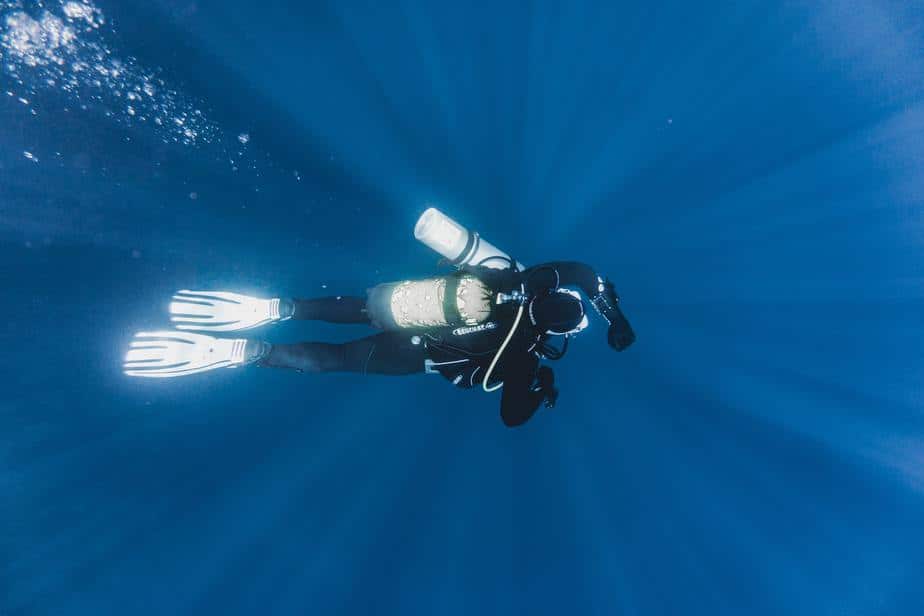
It’s not strictly necessary for you to be certified in order to dive. If you aren’t sure whether scuba diving is for you, then there are various one-day or half-day diving classes your resort may be offering. Furthermore, the most popular agencies like PADI, NAUI, and SSI offer their own version where an instructor will teach you the basics and supervise your diving at all times.
Check out PADI’s Discover Scuba course, SSI’s Basic Diver course, and NAUI’s Try Scuba course. These courses are a great introduction to scuba diving for people who are on the fence about this hobby. Maybe you’ll take it and find it boring, or maybe this is the start of a lifelong passion.
Keep in mind that outside of these one-day scuba courses, you normally have to be certified in order for dive shops to allow you to rent gear, refill scuba tanks, and go out for a boat dive. The reason for this is that diving can be a dangerous sport, and the training and experience you get from the Discover Scuba course is not enough.
So if you plan on diving just once as a bucket list item then we recommend taking the trial courses. Otherwise, you should get certified by taking the Open Water Diver course.
How much does it cost to scuba dive?

Scuba diving will cost you a few hundred dollars upfront to get certified and rent some equipment. This may seem expensive compared to other hobbies like swimming, however the tuition costs for a basic Open Water Diver course is similar in cost to:
- A weekend of kayaking, rock climbing, and fly-fishing lessons.
- Three hours of private golf lessons or water skiing lessons.
- Four private yoga lessons.
So the cost of getting started with scuba diving is in line with many other recreational activities. Furthermore, you can shop around for the best prices. You can find bargains by taking your OW Diver course in places like Koh Tao or Honduras.
However, keep in mind that going for the absolute cheapest dive course offered in an area does not necessarily mean you’re getting the same quality of instruction. When selecting which dive center you want to take the course with, we recommend filtering based on positive reviews instead of cost or how close it is to you.
Make sure you know what exactly is included in the price and which are add-ons. Maybe a course has a deceptively low price, however they charge extra for equipment rental fees or textbooks fees and so on.
Also keep in mind that the costs we have discussed so far is just to start scuba diving. This is not factoring the cost of purchasing your own scuba equipment (or recurring rental fees), of going on a liveaboard safari, of getting new certifications, of diving travel insurance, of refilling your scuba cylinder(s), of plane tickets, or of chartering a boat.
If the scuba diving bug gets you, then you could easily spend thousands of dollars over the years. Just a high-end dive computer alone can cost over a thousand dollars, though budget options are available. Be prepared to exercise restraint so that you don’t empty your bank account getting the next equipment upgrade for an upcoming trip.
Are there cheaper ways to learn how to dive?
Outside of the major scuba training agencies, there are some organizations that teach scuba diving within a club environment where the staff work as volunteers. This environment is conducive to fostering a community where everybody is assisting each other in becoming a better diver.
Examples of such organizations are the YMCA in the US, BSAC in the UK, and CMAS in France.
Note: Online scuba courses that do not have an in-person component where an instructor can teach you face-to-face are incomplete and not recognized by any dive resorts.
Is it worth getting certified?

If you plan on diving recreationally, then you need to get certified to get the most that diving has to offer. Dive shops will not rent out equipment, refill your scuba tanks, or let you dive if you aren’t certified. You can’t even access certain dive sites if you aren’t certified. In other words, if you plan on diving past the Discover Scuba diving course, then you need to be certified.
Other than the upfront cost of certification, another barrier of entry is the difficulty of getting certified. If you are not a strong swimmer and have no experience with dive theory, then it can be a challenging few days for you.
However, if your instructor is doing a good job, then you should be able to learn and get hands-on experience with all of the scuba theories and skills you need to safely dive.
Once you’ve passed the Open Water Diver course, you can now take advantage of the services offered by dive centers. You will have a maximum depth limit of 18 m (60 ft), which should be plenty for recreational diving. You can also use PADI Travel to find PADI affiliated dive shops all over the world that you can dive with.
Another benefit of getting certified is that the certification never expires. However, if it has been a long time since you last went diving, consider taking a refresher course to get up to speed.
You might be wondering which scuba training agency to be certified with. Truthfully, at the beginner’s stage, it doesn’t matter. Whether you go with PADI, SSI, NAUI, or any other major training agency, they all teach essentially the same thing. Certifications are recognized between organizations so you don’t have to worry about that either.
After reaching the entry-level, you can decide if you want to continue getting new certifications or if you’re content with recreational diving. Getting certified is the minimum step. If you aren’t certified, you will be limited to introductory scuba courses which are very limiting in what you can do and where they are located.
If you want to experience scuba diving at a recreational level with little restrictions, then it is definitely worth getting certified.
How long does it take to get certified
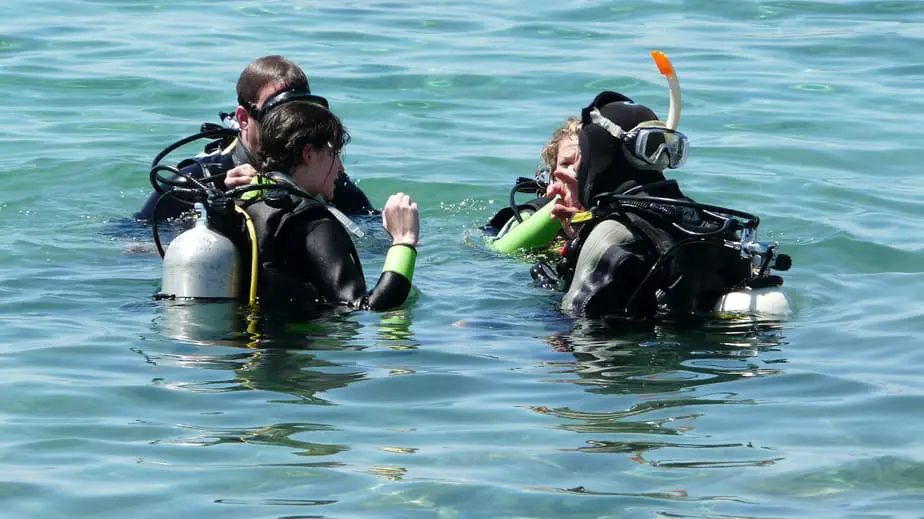
It only takes about 4 days to get certified. A typical scuba diving course will have three components: a knowledge component (in a classroom or online via E-Learning), a confined water component, and an open water component.
You should expect these days to be quite intense if you have no experience with diving. If this sounds intimidating, try taking the one-day Discover Scuba course to give you some idea of what to expect.
Learning under a time constraint doesn’t work for everyone since the added stress can affect your ability to retain information. The E-Learning component may be a better approach for some people who want to work out the dive theory at their own pace. If you go the E-Learning route, then you can skip the classroom component and head straight into the confined water portion of the course.
Some people prefer face-to-face lessons because they like being able to ask questions and seeing what the instructor is emphasizing. Being in a classroom can help some students focus because learning from home is not as motivating and there are distractions everywhere. It’s best to go with what is most beneficial for you – some prefer E-Learning, others prefer classroom learning.
You don’t have to book the dive course at a local dive center. You are allowed to take the course on vacation and dive in a tropical paradise instead. One advantage of this is that the warm, calm, and pristine water may make the experience much more enjoyable and even a bit easier.
However, you don’t want to waste your precious vacation time, so you should definitely go with E-Learning at home, do the pool sessions at a local dive shop, and finish up the diving component at the tropical destination. This is called a scuba referral and can save at least one day, if not two days of vacation time.
Are there scuba diving job opportunities?
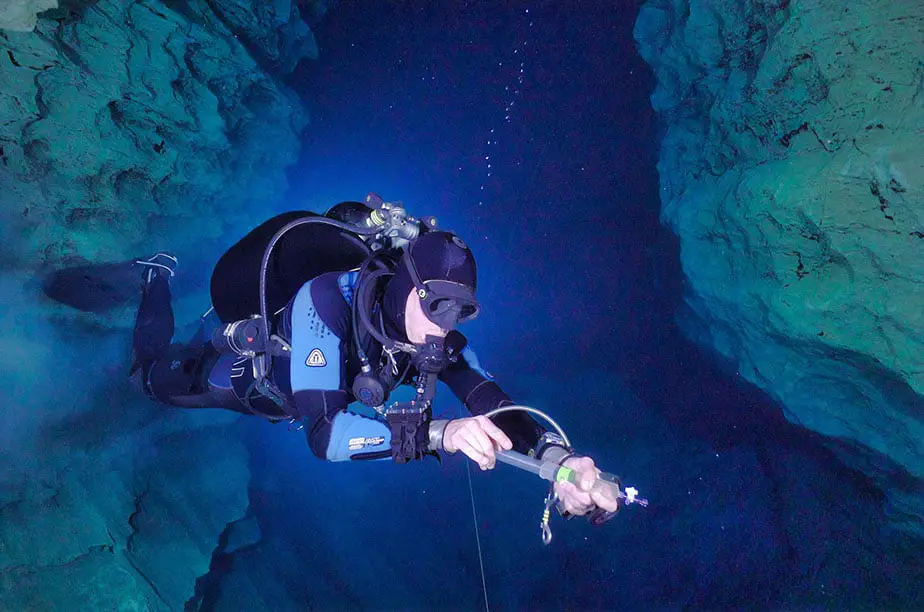
Depending on how far you go with scuba diving, you may be able to make a career out of it. The most obvious scuba career choice would be to become a scuba instructor yourself. However, like many careers revolving around teaching a leisure activity, it’s not exactly a lucrative career.
You need to be very passionate about diving and teaching, enough to make it part of your lifestyle. It needs to provide satisfaction and fulfilment because you can only do it for a limited number of years and the burn-out rate is high.
With that said, being a scuba instructor is not the only job you can do professionally as a scuba diver. You can get hired as a commercial diver for jobs like underwater welding. You can also have a career in the sciences such as being a marine biologist or collecting samples for scientists.
In order to be qualified as a professional diver, you need to at least be a certified Divemaster or above. Also, since scuba diving is a physically demanding activity, that puts a limit on how long you can be a professional diver for. It’s a lot harder to be a professional diver at 50 years of age or older than it is in your 20s and 30s.
Exclusive scuba diving experiences
There are some experiences that you can only enjoy if you are a scuba diver. These experiences can range from being relaxing and peaceful, to very fast-paced and intense. There’s something for the laid-back diver and the adventure-seeking adrenaline junkie. These include:
Total weightlessness like floating in space
When you’re at depth and you’ve reached neutral buoyancy, it is very similar to floating in space (not that we have any experience ourselves, but it seems very similar). In fact, NASA astronauts will train with scuba equipment before they head up to space, so that certainly gives it some legitimacy.
You can make it even seem even more similar by doing a night dive and staying close enough to the surface that you can see the stars. When surrounded by the weightlessness of the pitch black ocean, with stars as the backdrop, you will feel like an astronaut floating in space. Mastering your buoyancy control is instrumental for replicating this experience.
Explore wrecks
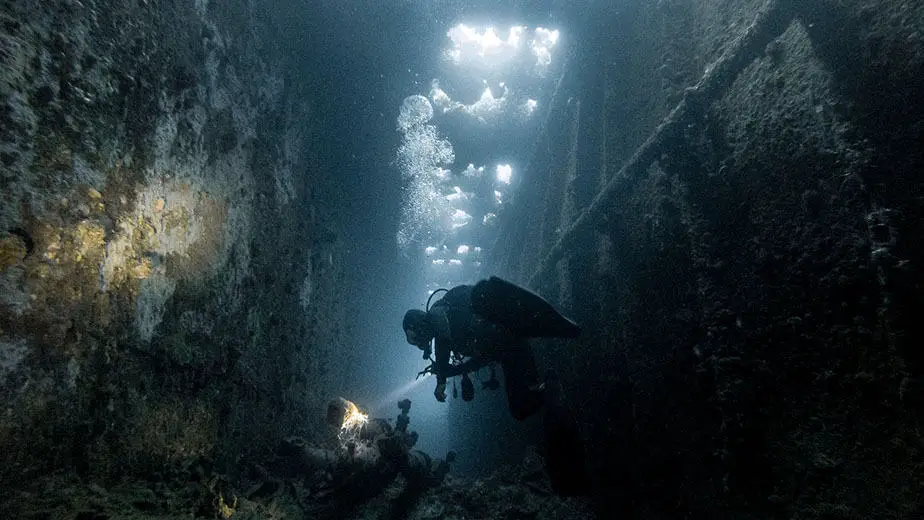
If a ship or plane sinks close enough to shore, then that will be a point of interest for wreck divers to examine a piece of history. You may be able to find a ship that sank during WWII or one that sank due to a terrible accident. Wreck diving is as much about the history as the diving itself.
Many wreck divers will want to learn about what the ship was like while it was in service, when it sank, how it sank, and how long it’s been at the bottom of the ocean. These things can improve the experience just like if you were visiting a war memorial.
Of course, it should go without saying that wreck diving can be quite a dangerous type of diving. Some wrecks have been deteriorating for decades, and you go inside of one at your own risk. It’s not unusual for walls to collapse or for silt to come off the walls and cause a silt out. You also have a risk of entanglement. Explore wrecks at your own risk.
Swim with sharks, dolphins, manta rays, sea turtles, etc.
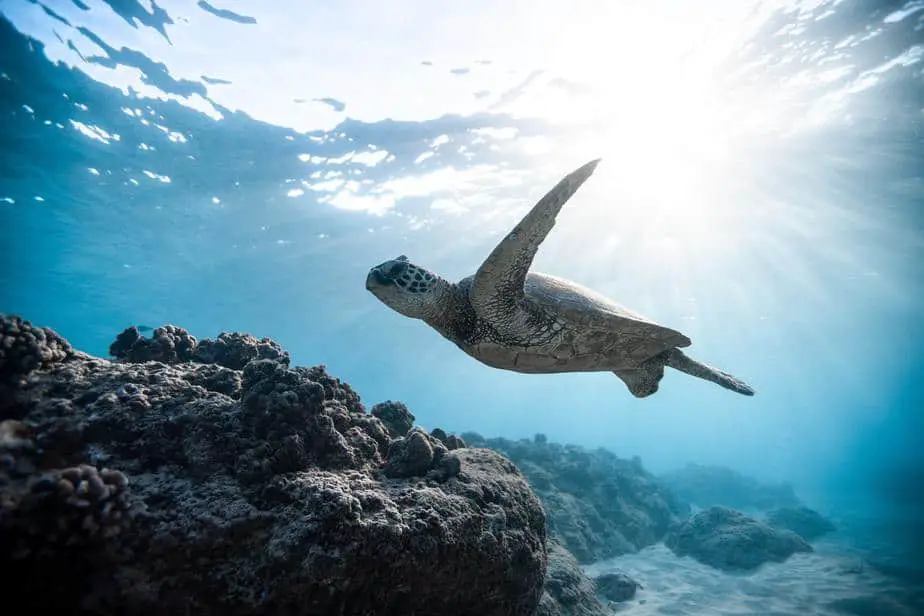
Another exciting but somewhat dangerous experience is to swim with sharks or manta rays. There’s nothing like coming across these majestic creatures in their natural environments and seeing them relatively close by. However, you still want to maintain your distance, because you never know how they might react.
Animals that appear to be calm can suddenly lash out at you. That was how Steve Irwin, also known as the “Crocodile Hunter”, lost his life to a stingray when it suddenly lashed out with its stinger, puncturing his heart and leading to his death.
So perhaps it’s not so much swimming with sharks as it is swimming next to sharks. The same goes for dolphins, manta rays, sea turtles, etc. You should keep a distance of at least 5 m or more and admire them from afar.
You can also swim with giant schools of tuna, jacks, barracuda, or trevally. When thousands of them are bunched together, it’s almost like they form one giant sea creature which is arguably an even more awesome experience than swimming with sharks.
Discover real-life aliens
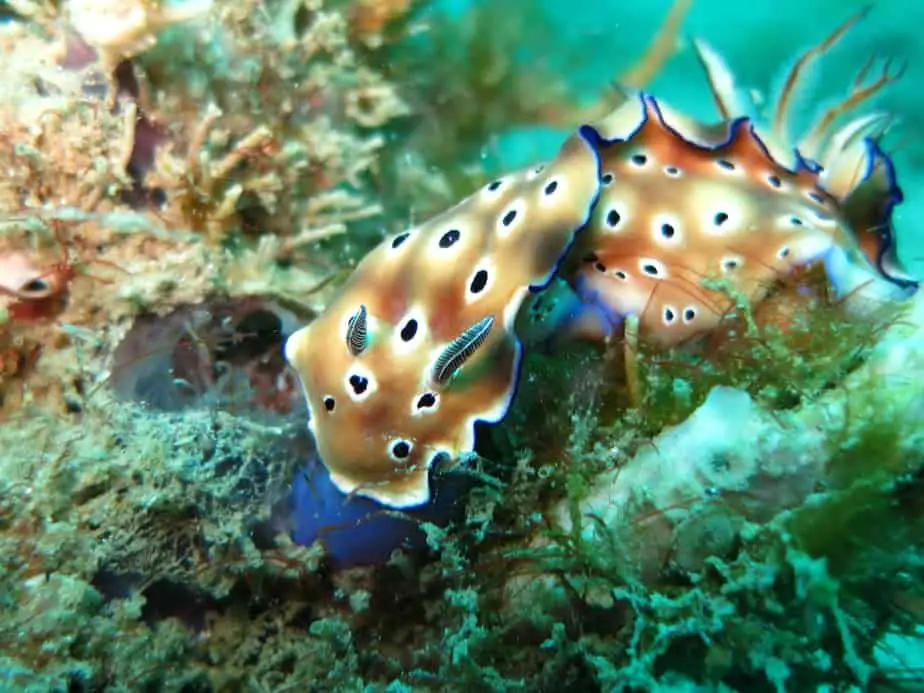
If you go muck diving or blackwater diving, you can discover some marine creatures that look like extraterrestrial life forms. Seriously, these creatures do NOT look like something that came from planet earth. Maybe they fell from space and started thriving in our oceans.
You’ll find creatures with impossible colors and shapes. Their incredible patterns and colors will mesmerize you and make you rethink the notion that aliens aren’t real. The great thing is, unlike sharks or manta rays, these creatures are harmless in comparison. Plus, due to the low visibility of the environments, you are supposed to get up close for a better look.
Go with the flow
Not only can the feeling of weightlessness while diving make you feel like you’re in space, you can also experience the sensation of flying by drift diving. Drift divers essentially ride the underwater currents so that they seem like they are gliding through the water.
If you’ve seen the movie Finding Nemo, it’s basically like the famous scene in the video we linked above, only you won’t have a laid-back turtle friend to accompany you.
Similar to surfing, you do not need to exert yourself. Once you’re in the current, do not try to swim against it. You’ll tire yourself out and you won’t be able to outswim the current. Just let it take you where it goes while keeping an eye on the exit point. As you approach the exit, swim to the outer edges of the current where it’s weaker until you exit it.
Take underwater pictures
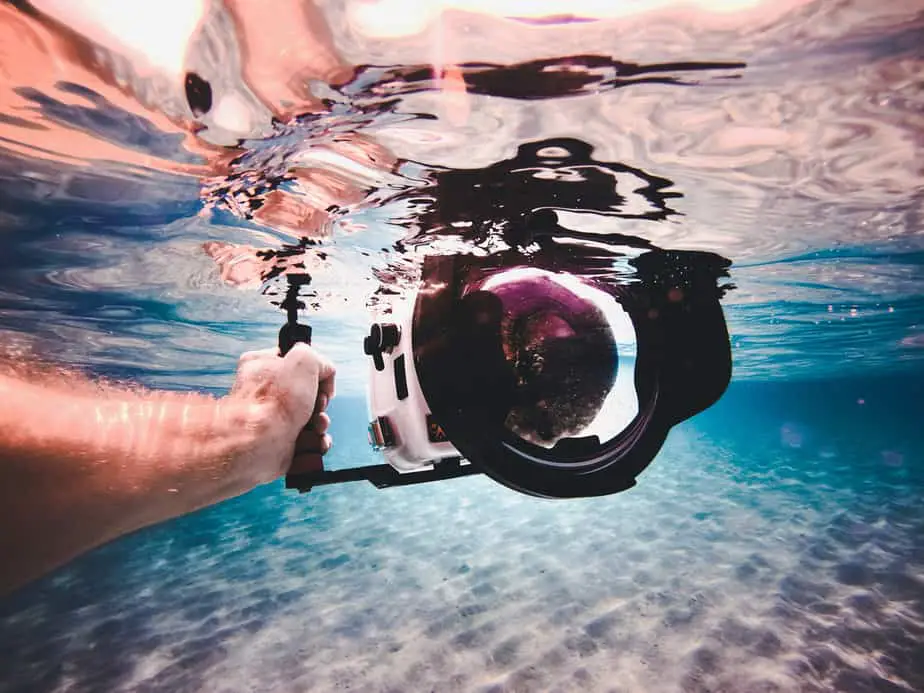
You know what’s cooler than taking nice pictures? How about taking nice pictures underwater. We mentioned that over 95% of the oceans are unexplored and undocumented. That means that the photos you’re taking could easily be something literally nobody has ever seen before.
Using either an underwater camera or a digital camera with a waterproof housing, you can record your diving adventures and have some memorable vacation photos to share with family, friends, and even strangers who you can regale with your tales.
Of course, the process of taking photos will be slightly different underwater. You have to figure out how to safely carry your camera – do you want a hands-free experience or do you want to manually hold it yourself.
You’ll also need to learn how to take pictures underwater. The biggest issue is lighting. Natural light doesn’t reach very far before you need to rely on your own dive lights. With your own lights, you need to make sure it’s a wide-beam light with even lighting otherwise some spots will be overexposed.
Deep diving
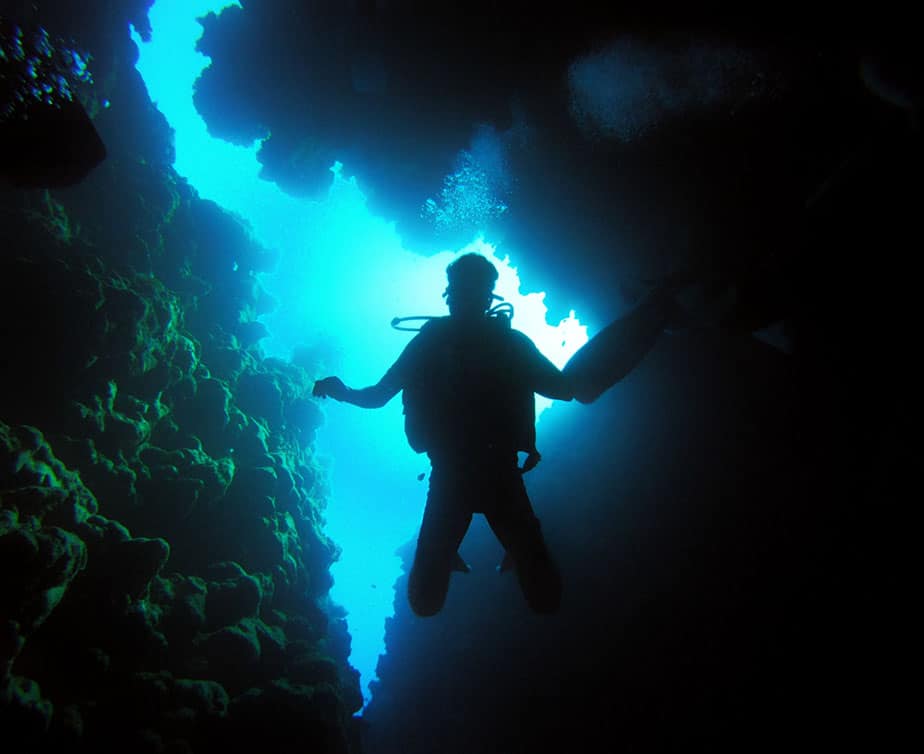
A deep diver is considered any dive past a depth of 40 m (130 ft). You will need to first take the Deep Diver course, and if you want to go deeper, then you’ll need to learn trimix diving by taking the Trimix Diver course which can teach you how to dive up to 90 m (300 ft).
Now why would someone want to dive that deep? For starters, some wreck sites or caves can only be accessed past a depth of 30 m. Even some wall dives require you to be quite far underwater. When you increase your depth limit, you increase your diving opportunities.
Also, some people just want to dive deep because they can. For the same reason why somebody would want to climb a mountain, some divers want to challenge themselves and go as far as they can underwater, literally. It’s something to brag about, but also the feeling of surpassing your old limits feels awesome.
When diving deep, all of your dives are decompression dives due to how quickly the NDL is reached. You’ll also be at greater risk of nitrogen narcosis and decompression sickness. The risks associated with deep diving are not worth it for the average diver, however veteran divers may love the challenges it provides.
Overhead diving
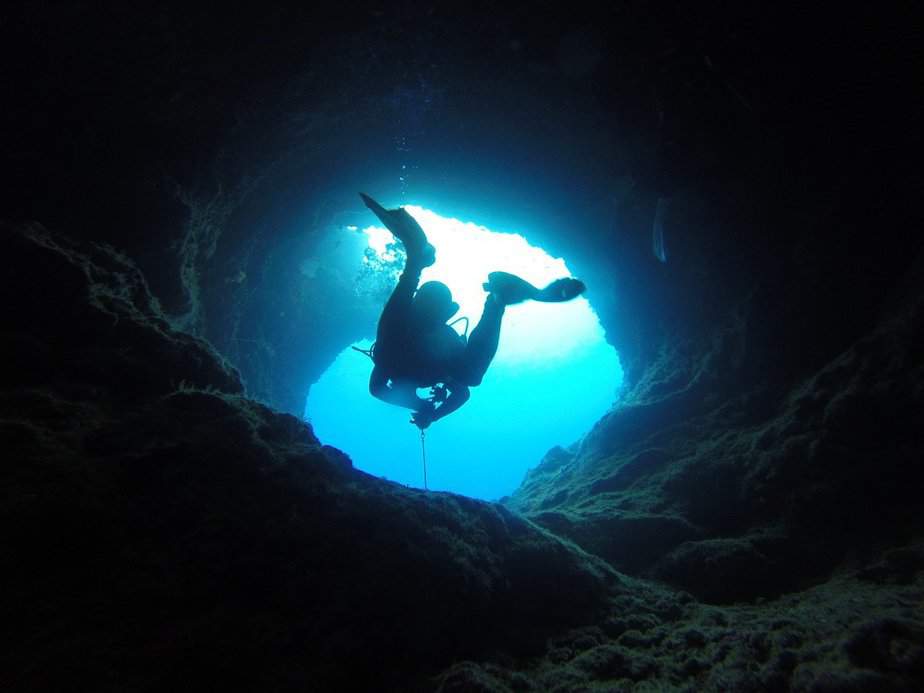
If you’re an adrenaline junkie, then you might want to try your hand with ice diving or cave diving. These types of diving require you to dive in an overhead environment, meaning something is preventing you from ascending to the surface in a straight path. They are highly risky, however each one rewards you with a unique diving experience.
In the case of ice diving, you will be treated to some of the most clear waters you will ever see as a diver. The waters are so calm and still that the visibility is over 100 ft in all directions. The animals you’ll see will also be a lot calmer because they have slowed down their metabolism in order to conserve energy.
For cave diving, the thrill and excitement is in discovering never before seen places. Cave diving is such an exclusive activity that you may very well be the first and only person to be in a particular section of a cave in a long time. There are some neat cave formations you can find, but mostly cave diving is for the most extreme divers who just want to challenge themselves.
The risks associated with overhead diving are quite high. For the average diver, it is not worth it to learn how to ice dive or cave dive. However, for the 0.1% of divers who are extreme adventure seekers and adrenaline junkies, it may be worth it for them.
Parting words
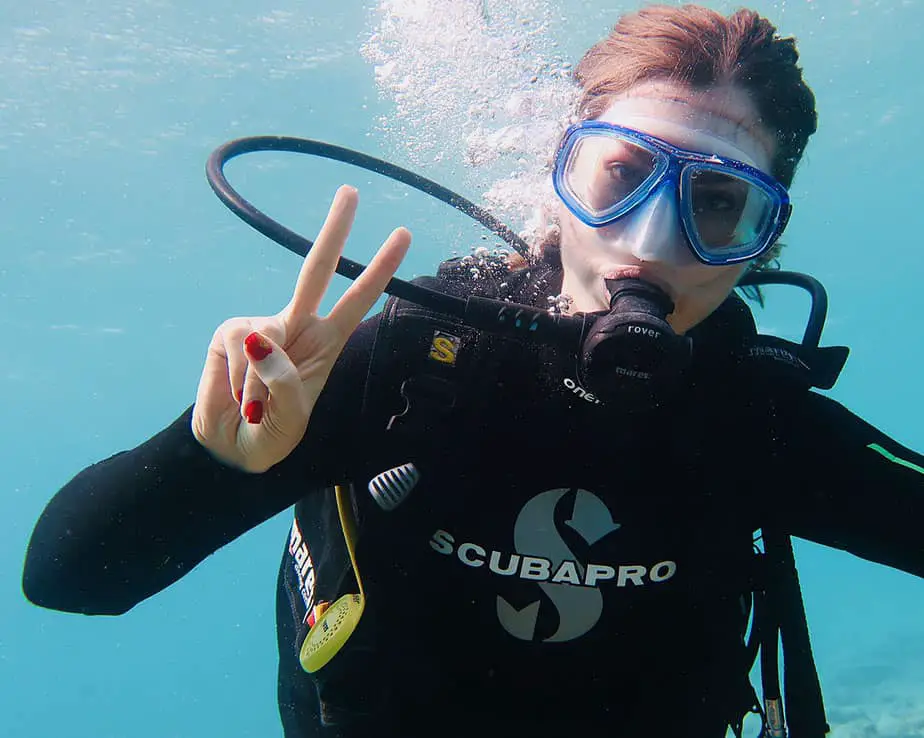
If you’re trying to figure out if scuba diving is worth it, we recommend asking your friends if they have any experience scuba diving or making a post on scuba diving forums and seeing what the veterans have to say.
You can also check out YouTube videos to see what kinds of incredible footage divers are capturing – perhaps you can get a firsthand experience of it one day. But the easiest way for you to know for sure if it’s for you is to try it yourself.
Book an introductory dive with a local dive shop and get a feel for scuba diving. Even if you don’t end up taking up diving as a hobby, we’re confident that you’ll still have a good time with your first time scuba diving.
Learning how to dive requires an upfront cost of time, money, and effort. It can even be a little frustrating, but anything worth doing requires some investment. Sometimes even experienced divers have their frustrations with how heavy their equipment is on land or if something malfunctions.
However, setbacks are a part of life, and scuba diving has significantly more positives than negatives. For instance, scuba diving is done basically everywhere in the world; no matter where you travel to, you can also scuba dive there.
Scuba diving is also worth it just for the exercise, meeting new people, and exclusive experiences that will provide great stories for your family and friends. Improving your diving skills and challenging yourself is also a large part of the fun.
If you’re an adventurous person who loves to socialize, challenge yourself, travel, and swim in the ocean, then scuba diving is absolutely worth it.

